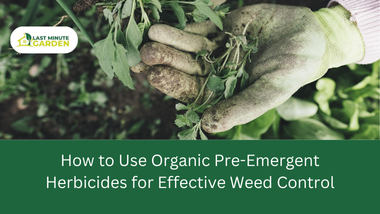Do you stare angrily at sprouting patches of crabgrass or tear your hair out when dealing with dandelions? There’s a better way, organic pre-emergent herbicides are the only safe solution for weed control.
Weeds are stubborn invaders, choke out plants, hijack nutrients, and spoil the look of a garden in no time. But where do these weeds magically come from? Their seeds have been stored in the soil for years, waiting for the right conditions to germinate and grow.
Resorting to chemical herbicides is a big no to cultivating a natural and eco-friendly space. So, how can you fend off weeds without compromising the health of your soil?
In this blog post, we’ll highlight how you can effectively use organic pre-emergent herbicides and discover practical insights into how these natural weed solutions work.
What Is an Organic Pre-Emergent Herbicide?

Herbicides are chemicals that kill plants. Unfortunately, no single herbicide will kill every type of weed, so it’s essential to match the product to the specific weed problem.
Some weed killer targets weeds that have germinated and are actively growing above the soil surface which is known as Organic post-emergent herbicides including vinegar and citric acid.
Pre-emergence herbicides on the other hand are weed killers that prevent weed seeds from sprouting above the soil surface, stopping the problem before it starts. These herbicides create a barrier on the soil surface that disrupts the process of weed seed development. An example of an Organic pre-emergent herbicide is a corn gluten meal.
How Do Organic Pre-Emergent Herbicides Work?
There is a common misperception that organic preemergence herbicides kill seeds directly. Instead, when sprouting seeds encounter the herbicide, cell division in the young root system is inhibited, resulting in the death of the young seedling.
The action mechanism of organic pre-emergent herbicides is straightforward. After applying them to your garden, they work by creating a barrier in the soil that prevents weed seeds from germinating.
These products generally do not control established vegetation, so it’s important to remove existing weeds from the garden prior to applying the herbicide.
Benefits of Using Organic Pre-Emergent Herbicides

Organic pre-emergent herbicides offer several advantages for sustainable gardeners:
- Safer for the Environment: Organic pre-emergents are typically made from natural ingredients, such as corn gluten meal, making them less harmful to soil, water sources, and nearby ecosystems. This means they help control weeds without causing runoff pollution or harming beneficial organisms like earthworms and pollinators.
- Improves Soil Health: Organic pre-emergent herbicides contain nutrients that can improve soil structure and fertility over time. For instance, corn gluten meal prevents weeds and also releases nitrogen into the soil which aids in plant growth.
- Reduces Soil and Water Contamination: Organic options break down naturally in the soil, which prevents harmful chemicals from leaching into groundwater. This reduces the risk of harmful residues building up in your soil.
- Reduces Weed Germination Naturally: Organic pre-emergents work by targeting weed seeds before they have a chance to germinate. Corn gluten meal, for example, forms a layer that inhibits root growth in newly germinating seeds, helping reduce the weed population without affecting established plants.
- Promotes Biodiversity: Unlike synthetic herbicides that may harm non-target plants or insects, organic options tend to have a more selective action, allowing desirable plants to grow while only inhibiting unwanted weeds. This encourages a healthy ecosystem and promotes biodiversity in your garden or landscape.
Steps to Effectively Use Organic Pre-Emergent Herbicides
Proper application is essential to get the most out of your organic pre-emergent herbicides. Here’s a step-by-step guide for effective usage:
- Know the Right Timing: Apply your organic pre-emergent herbicide just before the weeds are expected to germinate. For cool-season weeds, apply in early fall, while for warm-season weeds, apply in early spring. This timing prevents seeds from sprouting.
- Prepare the Area: Remove existing weeds before application, as pre-emergent herbicides won’t kill established plants. Use a hoe or pull them out by hand to ensure a clean surface.
- Apply Evenly: Spread the herbicide across the soil surface to cover areas where weeds are likely to sprout. If using a product like corn gluten meal, follow the recommended coverage to avoid overuse.
- Water In the Herbicide: Once you’ve spread the herbicide, apply water into the top inch of the soil, at least one-half inch of water is necessary to move the product into the soil. This helps it settle into the soil and form a protective barrier. It is advisable for Gardeners to use a hose or sprinkler to water the product thoroughly.
- Monitor and Reapply the herbicide as Needed
Organic herbicides may break down faster than synthetic products, so keep an eye on your garden and reapply according to the instructions on your chosen product. Apply the organic pre-emergent regularly to ensure ongoing protection against weeds.
Complementing Organic Pre-Emergent Herbicides with Other Weed Control Methods
For the best results, consider pairing organic pre-emergents with other sustainable weed control methods. Here are some complementary strategies:
Mulching: Add mulch around your plants to create an extra barrier that blocks weed seeds from germinating. Mulch also keeps your soil cool and retains moisture in the soil.
Hand Weeding: Even with pre-emergents, some weeds may still sprout. Regularly check your garden and pull out new weeds to prevent them from spreading.
Cover Crops: If you have unused spaces in your garden, plant cover crops like clover compete with weeds for space, sunlight, and nutrients to reduce the likelihood of weed growth.
Tips for using preemergence herbicides effectively:
- Apply the product before weed seeds germinate.
- Remove any dead vegetation, trash, or other debris from the site before applying the product.
- Use the right amount of water on the organic pre-emergent herbicide in the soil. If you don’t, it won’t work!
- Make one application in the fall to control winter annuals, and another in spring to control summer annuals. Apply when fall rains start in order to control next year’s crop of winter annuals.
- Avoid disturbing the soil in the application area to avoid holes in the barrier. Traffic from dogs, vehicles, or other sources across the treated area can cause the application to fail.
- Don’t use them in areas where you plan to grow plants from seed. Preemergent herbicides affect many germinating seeds, not just those of weeds.
Summary
Organic pre-emergent herbicides are excellent options for effective weed control because they create a preventative barrier against unwanted weeds and help maintain the health of your soil.
A well-maintained garden involves multiple layers of care and attention. Time your herbicide applications, choose the right organic products, and practice complementary techniques, so you can achieve a weed-free garden without sacrificing your commitment to sustainability.
Ready to take control of weeds naturally? Start using organic pre-emergent herbicides today!





